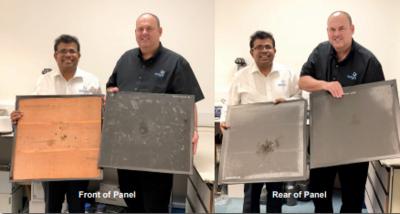Australia-based advanced materials technology company, Talga Resources, has reported outstanding conductivity results from its Talphene-enhanced epoxy composite trials undertaken at TWI in the UK. Carbon fiber reinforced polymer (CFRP) panels were constructed using a dispersion of Talga graphene (Talphene) in the epoxy-based resin of the composite and subjected to a range of conductivity tests pertinent to aircraft applications.
 CFRP test panels after lightning strike tests (Talphene panel on right in both photos). Image by Talga
CFRP test panels after lightning strike tests (Talphene panel on right in both photos). Image by Talga
Results reported by Talga showed the Talphene panel provided similar lightning strike protection as copper mesh panels currently used in composite aircraft but saved 75% of the weight of the copper. Further results demonstrating Talphene’s significant conductivity included up to 500% increase in dielectric constant, 100% increase in resin thermal conductivity as well as spot temperatures well over 100 degrees celsius in anti-icing trials.
Talga will now progress its products in the composites market using these prototype test results as the catalyst to initiate joint development and commercial agreements with global end users.

